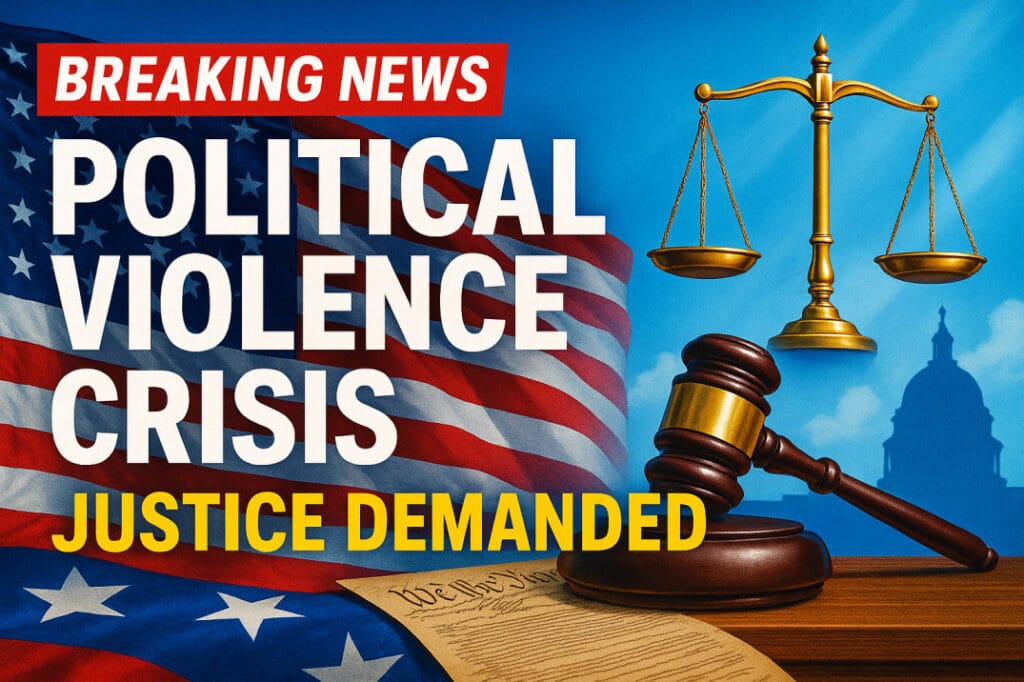Political Violence Reaches New Heights: Latest Developments in the Charlie Kirk Assassination Aftermath

The assassination of Charlie Kirk continues to send shockwaves through American politics as new developments emerge daily, painting a disturbing picture of escalating political violence and its far-reaching consequences. Three days after the Turning Point USA founder was gunned down at Utah Valley University, the nation grapples with the implications of what Utah Governor Spencer Cox correctly identified as a “political assassination”—and the troubling responses it has generated from both supporters and critics.
Presidential Leadership in a Time of Crisis
President Trump’s response to Kirk’s murder has demonstrated the kind of decisive leadership Americans expect during national tragedies. The White House has issued a formal proclamation honoring Charlie Kirk’s memory, recognizing his significant contributions to conservative youth activism and American political discourse. This official recognition underscores the gravity of the situation and the administration’s commitment to treating this incident with the seriousness it deserves.
More significantly, the President has called for the death penalty for Tyler Robinson, the 22-year-old suspect now in federal custody. This stance reflects not only the heinous nature of the crime but also sends a clear message that political assassination will face the full force of American justice. In an era where political violence has become increasingly normalized by some segments of society, presidential leadership demanding maximum accountability is both necessary and appropriate.
The President’s position on capital punishment for Robinson aligns with federal law regarding politically motivated murders and demonstrates that the administration will not treat this as merely another criminal case. This is a political assassination that strikes at the heart of American democracy, and the response must be proportional to the threat it represents to our constitutional order.
A Widow’s Heartbreaking Words Echo Around the World
Perhaps the most emotionally powerful development has been the first public statement from Erika Kirk, Charlie’s widow, who courageously stepped forward to address the nation in her time of unimaginable grief. Her declaration that her “cries will echo around the world” captures not only her personal anguish but also the global significance of this tragic event.
Erika Kirk’s words resonate far beyond personal loss—they represent the voice of every conservative who has faced threats, intimidation, and violence for their political beliefs. Her courage in speaking publicly so soon after her husband’s murder demonstrates the same strength and conviction that made Charlie Kirk such an effective leader. Her statement serves as a rallying cry for conservatives worldwide who refuse to be silenced by violence and intimidation.
The international attention this case has garnered, as reflected in Erika’s comments, highlights how America’s internal political violence affects global perceptions of democratic stability. When political leaders are assassinated for their beliefs, it sends a chilling message to democracies worldwide about the fragility of peaceful political discourse.
FBI Investigation Reveals Disturbing Premeditation
The completion of the FBI’s intensive 30-hour manhunt has yielded crucial information about Tyler Robinson’s motivations and planning. Most disturbing is the revelation that Robinson had expressed anger over Charlie Kirk’s beliefs prior to carrying out the assassination. This detail transforms the narrative from a spontaneous act of violence to a calculated, premeditated attack on conservative ideology itself.
This premeditation aspect is crucial for understanding the broader implications of Kirk’s murder. Robinson didn’t simply snap in a moment of passion—he harbored sustained animosity toward Kirk’s political positions and made the deliberate decision to silence those views through murder. This level of planning suggests a degree of radicalization that should concern all Americans, regardless of their political affiliations.
The fact that Robinson’s own family member ultimately turned him in to authorities provides a glimmer of hope that moral courage still exists even within families torn apart by political extremism. This family member’s decision to choose justice over loyalty demonstrates that not all Americans have succumbed to the tribal thinking that increasingly characterizes our political discourse.
Conservative Voices Sound the Alarm on Political Warfare
Jack Posobiec, a prominent Turning Point contributor and close friend of Charlie Kirk, has provided perhaps the most sobering analysis of the current situation. In his interview with CNN, Posobiec characterized the assassination as part of “asymmetric civil warfare”—a description that, while stark, accurately captures the one-sided nature of political violence in contemporary America.
Posobiec’s analysis highlights a troubling reality that mainstream media often ignores: conservative figures face disproportionate levels of threats and violence compared to their progressive counterparts. The term “asymmetric” is particularly apt because it describes a conflict where one side—in this case, radical leftists—employs violence and intimidation while the other side—conservatives—continues to operate within the bounds of civilized political discourse.
This asymmetric warfare has been building for years, manifesting in everything from the attempted assassination of Republican congressmen at a baseball practice to the routine disruption of conservative speakers on college campuses. Kirk’s murder represents the tragic culmination of this escalating pattern of violence against conservative voices.
Media Awakening to Political Violence Crisis
The extensive coverage by major news outlets, including PBS News Weekend’s dedicated segment on “rising concerns about political violence,” suggests that even mainstream media can no longer ignore the crisis facing American political discourse. For years, these same outlets downplayed or ignored violence against conservatives while amplifying every perceived slight against progressive figures.
This media attention, while welcome, comes too late for Charlie Kirk and raises questions about whether the coverage would be as extensive if the victim had been a progressive activist. The disparity in media treatment of political violence based on the victim’s ideology has contributed to the current crisis by creating an environment where violence against conservatives is implicitly treated as less newsworthy or concerning.
The fact that PBS and other mainstream outlets are now acknowledging the broader pattern of political violence suggests that Kirk’s assassination may finally force a national reckoning with this issue. However, the media’s response must go beyond mere coverage to include serious examination of their own role in creating the toxic environment that enabled this tragedy.
The Disturbing Response from the Far-Left
Perhaps most revealing about the current state of American political discourse has been the response from some quarters to Kirk’s assassination. According to Al Jazeera’s reporting, teachers and other public figures who made critical comments about Kirk’s death are now being doxxed by far-right groups. While this vigilante response is inappropriate and should be condemned, it reflects the deep frustration among conservatives who feel that their voices are systematically silenced while their opponents face no consequences for inflammatory rhetoric.
More troubling than the doxxing, however, has been the celebration and justification of Kirk’s murder by some progressive activists on social media. These responses reveal a disturbing level of dehumanization of conservative figures that makes political violence seem acceptable or even praiseworthy to some on the left.
This reaction demonstrates how far American political discourse has deteriorated. When the assassination of a political figure is met with celebration rather than universal condemnation, it signals a breakdown in the basic norms that make democratic society possible.
The Path Forward: Justice and Reflection
As Tyler Robinson awaits trial, the American people must grapple with the broader implications of Charlie Kirk’s assassination. This tragedy should serve as a wake-up call about the dangerous trajectory of political discourse in America and the urgent need for leaders across the political spectrum to condemn violence unequivocally.
The pursuit of justice for Charlie Kirk must include not only maximum punishment for his killer but also a serious examination of the cultural and political factors that enabled this tragedy. Conservative leaders must continue speaking truth while demanding equal protection under the law. Progressive leaders must honestly confront the role that inflammatory rhetoric against conservatives has played in creating an environment where political assassination becomes thinkable.
Charlie Kirk’s legacy should be a renewed commitment to the principles he died defending: free speech, open debate, and the peaceful resolution of political differences. His assassination must not be allowed to silence the conservative movement but should instead inspire even greater dedication to the cause of liberty and constitutional government.
The echoes of Erika Kirk’s cries must indeed reach around the world—not just as a lament for her murdered husband, but as a warning about what happens when political violence becomes normalized in a democratic society. America stands at a crossroads, and the choices made in response to this tragedy will determine whether we can restore civility to our political discourse or continue down the dark path toward further violence and division.












